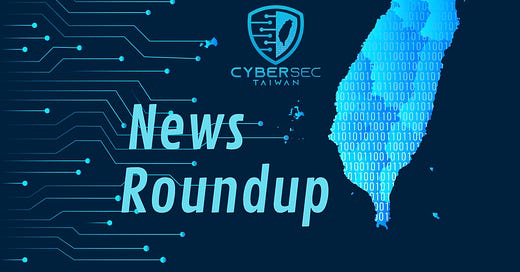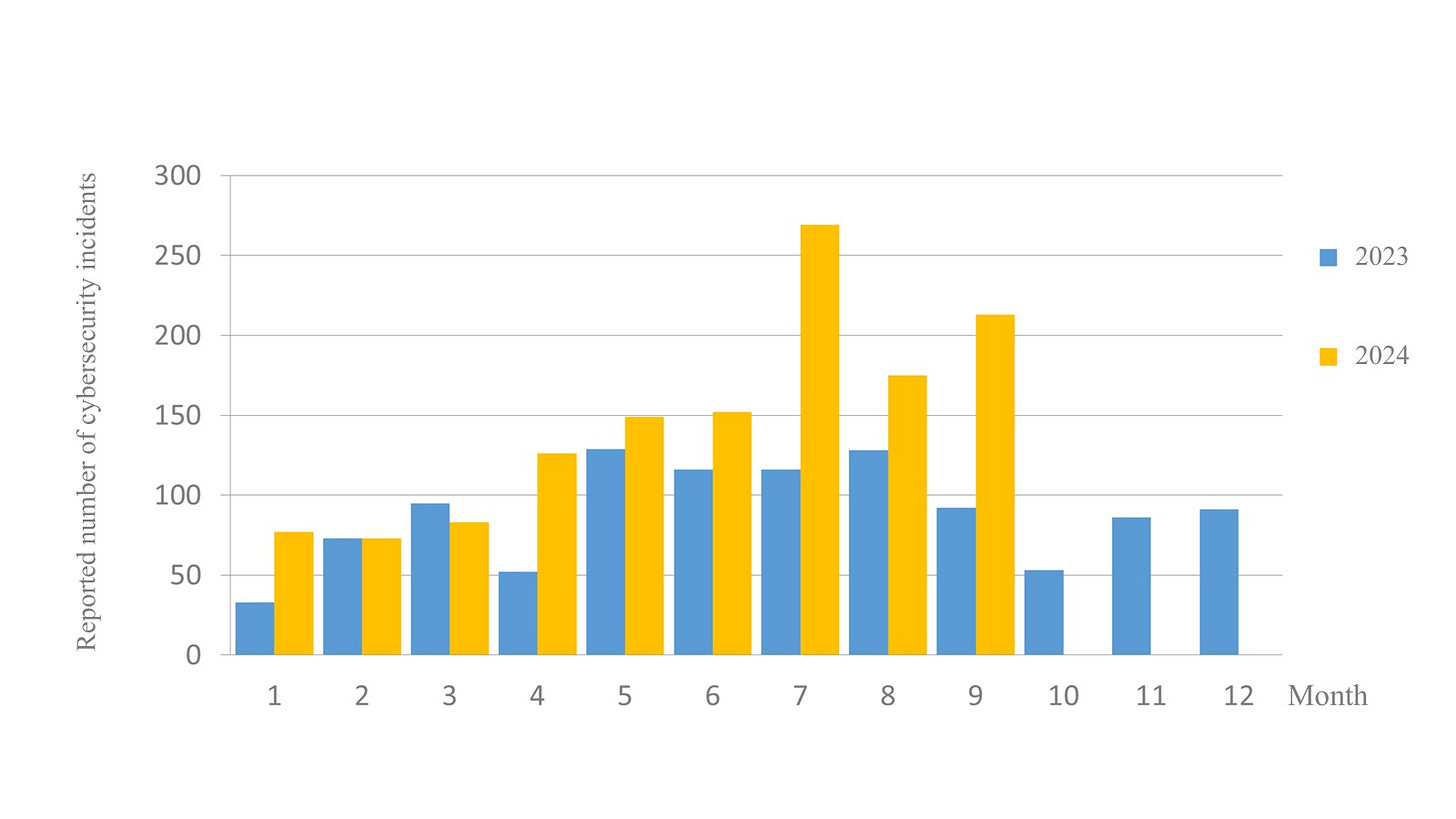News Roundup: (PART 2) November 1-15, 2024
Bite-sized news and updates on the latest in Taiwan cybersecurity
Taiwan is Victim to Highest Cyberattack Volume in Asia-Pacific
November 12, 2024
Taiwan has become the most targeted economy in the Asia-Pacific region, facing an average of 4,129 cyberattacks per organization each week during Q3 2024. This marks a 44% year-over-year increase, with hardware vendors, government and military institutions, and the manufacturing sector being hit hardest, averaging 7,046, 5,357, and 4,175 attacks weekly, respectively. The surge in attacks highlights Taiwan’s vulnerability as a technological and geopolitical hub, underscoring the need for advanced cybersecurity measures to protect critical industries and infrastructure from increasingly sophisticated threats such as phishing and ransomware.
Taiwan and Czech Republic Strengthen Digital Resilience Through Collaboration
November 12, 2024
Taiwan and the Czech Republic are deepening their democratic partnership through enhanced collaboration in cybersecurity and semiconductor innovation. During a meeting with Czech lawmakers led by Marek Benda, President Lai Ching-te emphasized the shared values of democracy and freedom and praised ongoing initiatives, including the establishment of the Advanced Chip Design Research Center (ACDRC) and the Supply Chain Resilience Center (SCRC). These programs, alongside bilateral discussions on cybersecurity and countering disinformation, highlight a strategic push to fortify supply chain resilience and technological capabilities. Czech Cybersecurity Hub Director Tomas Pitner and Taiwan’s National Science and Technology Council are key players in these efforts, which also include fostering talent through scholarships and promoting trade via the Czech Centre Taipei. Together, these initiatives reinforce a strong commitment to innovation, security, and economic collaboration.
Microsoft Expands Cloud Services in Taiwan with New Data Center
November 14, 2024
Microsoft has officially launched its Taiwan data center, introducing its "AI+ Taiwan" initiative to empower the island's digital transformation and AI economy. Key offerings include Microsoft 365's Advanced Data Residency (ADR) and Multi-Geo capabilities, enabling customers to store sensitive data within Taiwan while ensuring compliance and security. Targeting industries like healthcare, finance, and government, the initiative aims to boost operational efficiency through low-latency cloud services.
In collaboration with Taiwan’s government, Microsoft is also focusing on cybersecurity with a zero-trust architecture, knowledge-sharing, and joint workshops. Talent cultivation is another priority, with initiatives such as the "CODE; WITHOUT BARRIERS" program aimed at training 30,000 Taiwanese women in AI by mid-2025. According to IDC, the data center's operations are projected to generate nearly 49,000 jobs in Taiwan by 2028, reflecting Microsoft's long-term commitment to fostering innovation and growth in the region.
Taiwan at the Forefront of Cybersecurity Innovation: Insights from Code Blue 2024
November 15, 2024
Taiwan's prominence in global cybersecurity was underscored at CODE BLUE 2024 in Tokyo, with TeamT5 and CyCraft Technologies showcasing groundbreaking research. TeamT5, a leader in threat intelligence with operations in Taiwan and Japan, presented a critical analysis of China's evolving cyber tactics. Highlighting the integration of hack-and-leak operations with influence campaigns, the presentation shed light on China's strategies to destabilize democratic elections, including the use of generative AI to amplify disinformation. Drawing on case studies from Taiwan's 2024 presidential election, TeamT5 emphasized the expanded targeting of legislators and proposed actionable mitigation strategies to counter these advanced threats.
CyCraft Technologies brought a technical edge to the conference with their innovative research on the robustness of Retrieval-Augmented Generation (RAG) systems, which enhance Large Language Models with real-time retrieval capabilities. Their framework, "BullyRAG," introduced a multi-perspective evaluation method to identify vulnerabilities in RAG systems against misinformation, malicious instructions, and remote code execution. By using a dynamic dataset and evaluating leading LLMs, CyCraft highlighted Taiwan’s role in advancing AI security, reinforcing the nation’s commitment to strengthening digital resilience on the global stage.
Administration for Cyber Security, MODA: Cybersecurity Monthly Report (September 2024)
November 15, 2024
Taiwan’s Administration for Cyber Security, under the Ministry of Digital Affairs (MODA), released its September 2024 Cybersecurity Monthly Report, revealing critical insights into the nation’s digital threat landscape. The report recorded 78,515 pieces of joint defense intelligence, with information collection through scanning, detection, and social engineering attacks comprising 41% of identified threats. Notable incidents included spear-phishing campaigns leveraging ProtonMail accounts, where attackers disguised malicious files as environmental petitions targeting government agencies. Cybersecurity incident reports rose to 213, marking a significant increase compared to the same period last year, largely driven by attacks coinciding with military exercises. Additionally, the report flagged risks of personal data leaks due to improperly masked sensitive information in government documents, prompting swift action and revised protocols to strengthen data protection. These findings emphasize Taiwan’s proactive measures to counter evolving cyber threats and reinforce the importance of hardened defense strategies across public institutions.
Taiwan, Cybersecurity, and U.S.-China Tensions Highlighted at APEC Summit
November 16, 2024
At the APEC summit in Peru, Taiwan and cybersecurity emerged as key points of contention during discussions between U.S. President Joe Biden and Chinese President Xi Jinping. Biden criticized China’s military activities near Taiwan as destabilizing, while Taiwan denounced Beijing’s actions as the greatest threat to regional peace and global stability. On cybercrime, Biden raised concerns about alleged Chinese cyberattacks targeting U.S. officials. Xi denied the allegations and called for mutual respect, leaving the discussion on cybercrime lacking substance or concrete outcomes. These exchanges emphasized the growing challenges in U.S.-China relations over Taiwan's sovereignty and digital security.
NCCU Advances Credit Card Fraud Detection with Cutting-Edge Research
November 17, 2024
The Taiwan Academic Cybersecurity Center (TACC) research team from National Chengchi University (NCCU) has achieved a milestone with the acceptance of their paper, "Credit Card Fraud Detection via Intelligent Sampling and Self-supervised Learning," in the prestigious ACM Transactions on Intelligent Systems and Technology. Recognizing the rising need for robust fraud detection in Taiwan's digital economy, the team tackled challenges like data imbalance and noise labels in existing systems. Their innovative method employs intelligent sampling and self-supervised learning to accurately capture spatial and temporal features in financial transactions. Tested on real-world datasets, their approach significantly outperformed standard methods, delivering improved F1 scores and enhancing risk management for financial institutions—a crucial step for Taiwan's growing digital finance sector.
CyberSec Taiwan
About CyberSec Taiwan
Your source for the latest news and analysis on Taiwan-centric cybersecurity.











